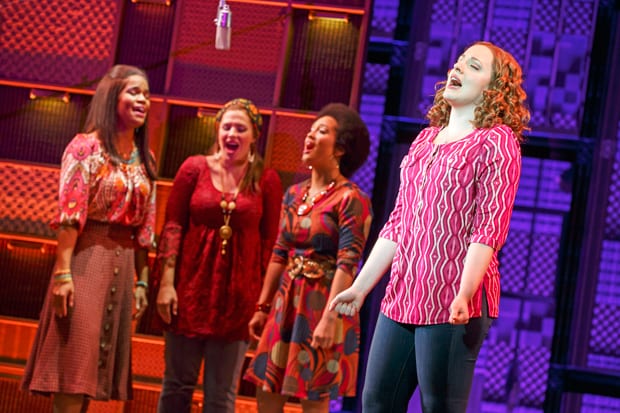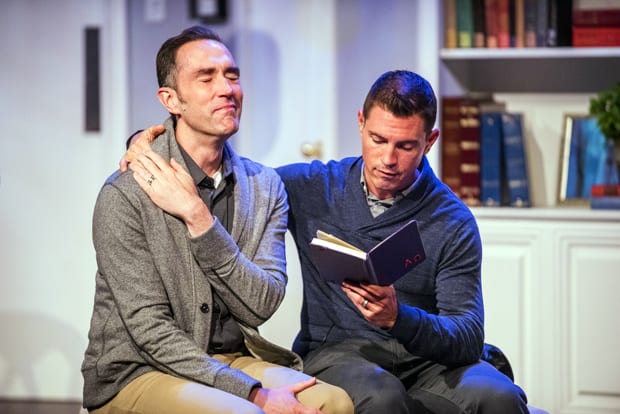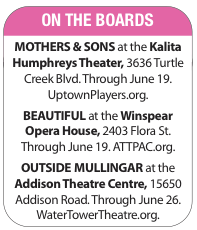Living life to its fullest in ‘Beautiful,’ ‘Mullingar,’ ‘Mothers & Sons’

Carole King (Abby Mueller) composes the soundtrack of a generation in the jukebox musical ‘Beautiful.’
ARNOLD WAYNE JONES | Executive Editor
jones@dallasvoice.com
Carole King’s music mirrored the full pageant of the rock ‘n roll era. From soul anthems like “Natural Woman” to novelty dance ditties like “Locomotion” and soft-rock classics like “You’ve Got a Friend,” you can hardly imagine any occasion where one of her songs would not work as the background music to life’s great moments. That richness is much of what gives Beautiful: The Carole King Musical, its amazing texture. Unlike, say, Jersey Boys, which celebrates one group’s sound, or even Mamma Mia!, which shoehorns one group’s catalogue into a conventional book-musical narrative, Beautiful is a songwriter’s tribute with all the ups-and-downs of a creative — not interpretive — artist. You feel King in every note, every lyric.
The show is as ebullient and joyful as any contemporary musical since The Drowsy Chaperone. It opens in Brooklyn during the poodle-skirt days of teenybopper music. Carole (Abby Mueller, sister of Jessie Mueller, who created the role on Broadway) is a 16-year-old college student with aspirations to write a hit song. She pairs up with sexy budding lyricist Gerry Goffin (Liam Tobin), goes to work for Don Kirschner, and a legend is born.
But legends have high and low points. Gerry cheats on her and has emotional problems, but through it all, Carole martials along, turning out songs that reflect (and sometimes deflect) her personal turmoil, which will eventually culminate in Tapestry, one of the most acclaimed, honored and best-selling albums of all time.
But this isn’t a lemons-to-lemonade story. The great depth of its appeal is how strong yet vulnerable Carole is — secure in her talents, but doubtful as to her sex appeal. It’s one of the most complexly written leading roles in a musical comedy, and Mueller’s upbeat, somewhat defiant performance hits it home. The whole cast rocks it, with great comedic support from Becky Gulsvig and Ben Fankhauser as Cynthia Weil and Barry Mann (a rival songwriting couple), brisk staging by Marc Bruni and, of course, a score that is par excellence. Just try walking out not humming a tune and feeling hopeful.
 Hope plays a central role in the lives of the characters in Outside Mullingar — even hope that seems drowned by life’s occasional tragedies… and tragedies abound here because, well, it’s Ireland. The Irish are a peculiar lot, and plays and films set there are plump with an atmosphere of beautiful, hilarious dread. The plays of Martin McDonagh reveal a sense of horror masquerading as day-to-day normalcy. (Psychopathic cat owners. Matricidal spinsters. Felonious gravediggers.) Even a sprightly musical like Brigadoon is premised on a lovely Irish village that disappears into the mist for a century at a time — hardly the makings of a conventional happy ending.
Hope plays a central role in the lives of the characters in Outside Mullingar — even hope that seems drowned by life’s occasional tragedies… and tragedies abound here because, well, it’s Ireland. The Irish are a peculiar lot, and plays and films set there are plump with an atmosphere of beautiful, hilarious dread. The plays of Martin McDonagh reveal a sense of horror masquerading as day-to-day normalcy. (Psychopathic cat owners. Matricidal spinsters. Felonious gravediggers.) Even a sprightly musical like Brigadoon is premised on a lovely Irish village that disappears into the mist for a century at a time — hardly the makings of a conventional happy ending.
And so it is with the Muldoons and the Reillys, neighboring farmers in damp central Ireland. The Muldoon patriarch has just died, which leaves an opportunity for the senior Reilly (John S. Davies) to finally re-acquire a small strip of land — an easement, which he sold years ago but which has been a sore spot ever since. But the younger Reilly, Anthony (Jeremy Schwartz), might not even inherit the land, which creates a rift between father and son, exacerbated by Anthony’s prickly relationship with Rosemary Muldoon (Jessica Cavanaugh), the girl next door who has been crushing on him for 30 years … though he hasn’t seemed to notice.
It’s all very kitchen-sinky, with lilting brogues and clever wordplay, courtesy of author John Patrick Shanley. But when you let director Rene Moreno loose on this kind of material … well, something as magical as Finian’s rainbow appears. There’s no better director of actors anywhere that I have seen. He turns a cast into a collection of fully-fleshed-out humans as deftly as a close-up card sharp. There’s such effortless naturalism here, you almost forget that you’re even watching a play; it feels more as if you’re spying on the lives of real people.
And his actors do live those lives, so wonderfully. The tentative romance between Cavanaugh and Schwartz — middle-aged folks playing middle-aged folks — is expertly rendered by the leads, while Davies and Gail Cronauer as the irascible oldsters have breathtaking moments. Outside Mullingar isn’t a flashy play with hot-button moments. It must settle for just being an exceptionally engaging and true one about waiting until the moment’s right.
Family dynamics and the time to confront long-buried feelings take a different turn in the contemporary drama Mothers & Sons … though the story begins decades earlier.
In 1990, Terrence McNally won an Emmy for writing a TV movie called Andre’s Mother. It was the height of the AIDS crisis, and the film was set during the memorial of Andre, an actor who succumbed to the disease. Andre’s lover, Cal, was there, as was his disapproving mother Katherine, a humorless transplant to Texas who seems so cold she could not forgive her son for the sin of being different.

A married couple (Greg Lush and Kevin Moore, above) confront ghosts from their past in ‘Mothers & Sons.’
This new play builds on those characters, but it’s a loose sequel. Cal (Gregory Lush) is now a financially secure money manager with a new husband, Will (Kevin Moore) and a son Bud (Alex Prejean). Katherine (Marjorie Hayes), now a widow, shows up on their doorstep unannounced a few days before Christmas. She and Cal haven’t kept in close contact over the years, so Katherine is astonished to find he has moved on with his life when she clearly has not. She projects her disappointment with every icy gesture and sniping aside: How dare Cal continue to live, when her son’s life was cut down too soon?
It’s a play with each foot in a different generation of gay culture, seeking to bridge two eras: The scary-activist days of an epidemic that decimated gay society, and the more settled world where same-sex marriage is legal and acceptance the rule, not the exception. Will and Bud belong to the latter; Katherine and Cal to the former … only she never felt a part of it and he has evolved beyond it.
 In the broadest sense, Mothers & Sons is a political play, a play of ideas — it parses the rift between those who still live in a self-imposed labyrinth of bigotry and a culture that has moved on from them. At its worst, it sounds a bit old-fashioned and intentionally provocative, as if these arguments haven’t been hashed out for 35 years.
In the broadest sense, Mothers & Sons is a political play, a play of ideas — it parses the rift between those who still live in a self-imposed labyrinth of bigotry and a culture that has moved on from them. At its worst, it sounds a bit old-fashioned and intentionally provocative, as if these arguments haven’t been hashed out for 35 years.But at its best — and its best is exceptional — it subtly navigates the ways in which we communicate, how diplomacy in the face of ignorance if a blessing, and how ignorance morphed into hatred needs a sturdy slap to the face. Cal “handles” Katherine, diffusing her insults with light-hearted banter, using manners to soften her hard edges… until she crosses too many lines. The play has a lot to say about blame, self-pity and how age differences should not affect our innate humanity.
It’s a serious play, but not one without levity. The balance is achieved with the nimble ensemble. Moore has never been so natural onstage, and Lush delivers another well-crafted character who has to hide and reveal deep emotions within a hair’s breadth. Katherine’s hardness makes Hayes a tougher nut, but her genuineness comes through. Director Bruce R. Coleman and set designer Kevin Brown make excellent use of the stage, filling it with real lives, which is what makes Mothers & Sons resonate so profoundly … no matter how old you are.
This article appeared in the Dallas Voice print edition June 10, 2016.











